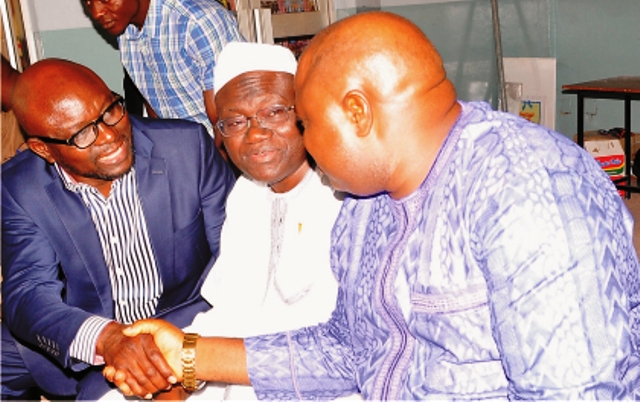Business
Experts List Gains Of New Forex Policy

Some financial experts
have said that the first Naira-Settled OTC FX Futures Market launched by the Central Bank of Nigeria (CBN) and FMDQ OTC Securities Exchange if well implemented would enhance foreign portfolio investment in the country.
They told our correspondent in Lagos that the Nigerian Stock Market and the economy would benefit from the initiative when properly handled.
The President, Association of Stock Broking Houses of Nigeria (ASHON), Mr Emeka Madubuike said that proper implementation of the initiative would boost foreign portfolio investment.
Madubuike said that the product would accord foreign investors the ability to repatriate their funds without any restriction, adding that, it would bring transparency to the foreign exchange market.
“It will be easier for people to move their funds from one place to the other with the introduction of the Naira-Settled OTC FX Futures Market”, he added.
He explained that the stock market would benefit more from the product if it was properly implemented.
Madubuike stated that the country’s productivity level would be efficient importers would be able to continue with their production with enhanced access to forex.
He stated further that the product would enable to country to clear backlog of forex incurred in the past.
The ASHON president said that the backlog was as a result of the nation’s dependent on importation which put pressure on the foreign exchange market.
“We are still watching its implementation process but if well implemented will affect the stock market and the economy positively”, Madubuike said.
The Chief Executive Officer, Stanbic IBTC Nominee, Mr Akeem Oyewale said the product would give certainty to investors especially the institutional portfolio investors to invest in Nigeria.
“It will allow them to get an idea of how much they can get their dollar whenever they so desired.
It allows investors to be more comfortable dealing with equities market in Nigeria.
“So if you are planning to get dividend of certain amount in the next three months and you want to fix your dollar you can go to the futures market to do it based on the offers and quote that you have in the market”, Oyewale said.
Oyewale said that the futures market in Nigeria would be a sustainable and stable market because of the credibility of the institutions driving the products.
The Tide reports that the apex bank and FMDQ have on Monday recorded another feat with the launch of the first Naira-Settled OTC FX Futures Market.
Business
Agency Gives Insight Into Its Inspection, Monitoring Operations

Business
BVN Enrolments Rise 6% To 67.8m In 2025 — NIBSS

The Nigeria Inter-Bank Settlement System (NIBSS) has said that Bank Verification Number (BVN) enrolments rose by 6.8 per cent year-on-year to 67.8 million as at December 2025, up from 63.5 million recorded in the corresponding period of 2024.
In a statement published on its website, NIBSS attributed the growth to stronger policy enforcement by the Central Bank of Nigeria (CBN) and the expansion of diaspora enrolment initiatives.
NIBSS noted that the expansion reinforces the BVN system’s central role in Nigeria’s financial inclusion drive and digital identity framework.
Another major driver, the statement said, was the rollout of the Non-Resident Bank Verification Number (NRBVN) initiative, which allows Nigerians in the diaspora to obtain a BVN remotely without physical presence in the country.
A five-year analysis by NIBSS showed consistent growth in BVN enrolments, rising from 51.9 million in 2021 to 56.0 million in 2022, 60.1 million in 2023, 63.5 million in 2024 and 67.8 million by December 2025. The steady increase reflects stronger compliance with biometric identity requirements and improved coverage of the national banking identity system.
However, NIBSS noted that BVN enrolments still lag the total number of active bank accounts, which exceeded 320 million as of March 2025.
The gap, it explained, is largely due to multiple bank accounts linked to single BVNs, as well as customers yet to complete enrolment, despite the progress recorded.
Business
AFAN Unveils Plans To Boost Food Production In 2026
-

 News3 days ago
News3 days ago2026 Budget: FG Allocates N12.78bn For Census, NPC Vehicles
-

 Sports3 days ago
Sports3 days agoAFCON: Osimhen, Lookman Threaten Algeria’s Record
-

 Politics3 days ago
Politics3 days agoWike’s LGAs Tour Violates Electoral Laws — Sara-Igbe
-

 Politics3 days ago
Politics3 days agoRivers Political Crisis: PANDEF Urges Restraint, Mutual Forbearance
-

 Sports3 days ago
Sports3 days agoArsenal must win trophies to leave legacy – Arteta
-

 Sports3 days ago
Sports3 days agoPalace ready To Sell Guehi For Right Price
-

 Sports3 days ago
Sports3 days agoTottenham Captain Criticises Club’s Hierarchy
-

 Maritime3 days ago
Maritime3 days agoMARITIME JOURNALISTS TO HONOUR EX-NIWA MD,OYEBAMIJI OVER MEDIA SUPPORT

